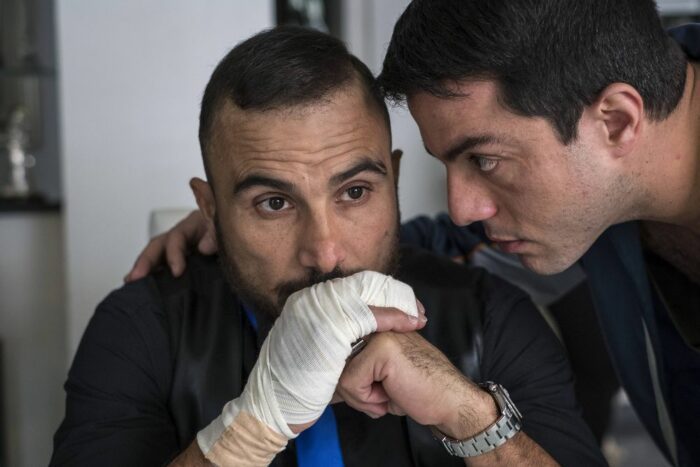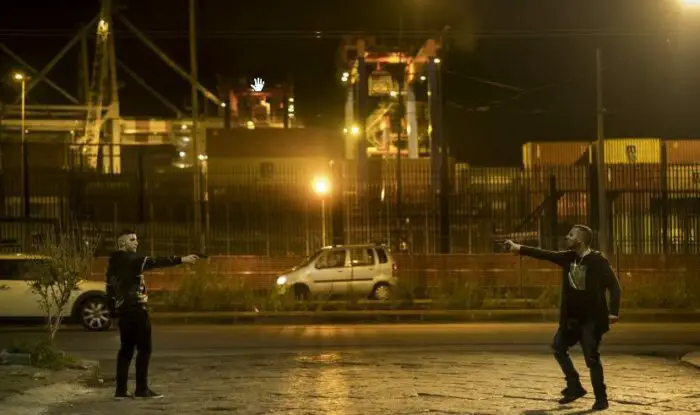It’s taken a long three years for The Mayor of Rione Sanità to arrive, finally, on video-on-demand for North American audiences, but Mario Montone’s intellectual crime thriller is well worth the long wait. For his filmic adaptation of Eduardo De Filippo’s classic play, Martone was awarded the Leoncino d’Oro Agiscuola Award for Best Director at the Venice Film Festival back in 2019—what seems like a lifetime ago. In the interim, his compelling drama, propelled by its charismatic, combustible titular protagonist, has lost none of its visceral impact.
As an adaptation of a stageplay, Montone’s film relies more on verbiage than violence. Long before the film’s other obvious antecedent—Francis Ford Coppola’s The Godfather in 1972, a film that similarly presented an ethical dilemma in the form of a justice-meting crime boss–De Filippo’s 1960 play Il sindaco del Rione Sanità (also known as The Syndicate) presented a “godfather” of its own. (De Filippo is less known outside his native Italy and remembered for the sources of Marriage Italian Style and Ghosts Italian Style.) Based on the real-life story of the playwright’s friend, a furniture maker from Rione Sanità, “The Mayor” as he was known to locals would settle their disputes with a blunt force. The degree to which his judgments were seen as just or ethical has been at the core of each of its stagings and adaptations, including the 1996 film The Mayor, which relocated the setting to New York and starred Anthony Quinn in the title role.
Here, Montone is adapting his own 2017 staging of the play, including much of his cast, including, especially, Francesco Di Leva as the titular “Mayor,” Don Antonio Barracano. Adjudicating disputes between locals with an apparently absolute authority, each day Barracono fields an audience of those who seek the justice or renumeration the legal system will not. He’s a mediator, barrister, and judge whose Solomonesque wisdom is punctuated with brass-knuckle gut punches and enforced by a small army of enforcers. He sees himself as a man of honor with the keen ability to distinguish between, as he puts it, “the decent and the scoundrel.”

De Filippo had written the part as that of an old-world grandfather in his 1970s, but Martone’s Mayor is a virile, tough, thirtysomething with tattoos across his torso and biceps bulging through his shirtsleeves. As Barracano, Di Leva completely convinces, physically commanding the screen with his street-tough posture and unwavering glare. But as ferocious and tense as Di Leva portrays the character, he is equally charismatic and intelligent: with every decision there is a rationalized, philosophical judgment delivered with uncanny candor and inventive measures. The criteria by which he administers justice has little to do with Italian law and more so his own idiosyncratic interpretation of Biblical law and local lore.
With each judgment meted there is also a penalty. This may be a savage beating or merely a painful, emasculating humiliation, but in every instance the judgment serves also to reinscribe his own absolute power among the Neapolitan locals. And Di Leva’s portrayal of Barracano, verbose and intelligent, charismatic and frightening, is absolutely unwavering in its intensity. The “rione” (or neighborhood) Sanità where he rules harbors a reputation for organized crime, a point Montone makes efficiently with an opening montage of Naples at night and several arresting images of the organized violence that occurs there and crescendoing with a shooting between two young punks.

From there, the film adheres to the three-act structure of De Filippio’s stageplay, with each successive scene focusing on the disputes brought before Barracano. The two young men are treated by the Don’s personal doctor, Fabio Della Ragione (Roberto De Francesco), before Barracano registers his judgment; he then arbitrates a dispute between a debtor and his creditor before the final, most pressing case: Rafiluccio Santaniello (Salvatore Presutto), whose conflicts with his father Arturo (Massimiliano Gallo) have escalated to the point where the young man wants him killed.
For a film that might be categorized as a crime thriller, the criminality and violence of The Mayor of Rione Sanità exists nearly entirely offscreen. Each scene is devoted primarily to the locals’ appeals to Don Antonio and his decision, like a courtroom drama played out in a Neapolitan godfather’s swank apartment. Were it not for the tremendous performance of Di Leva the film might sink under its own verbiage. Certainly, it is far more theatrically staged than most films treating similar subjects, but its dependence on De Filippo’s stageplay also foregrounds the film’s ethical dimensions. Is the Don truly a force for good in his own world? Can his peculiar form of harsh justice be meted out indefinitely? Is he bound by his own rules? And who, in his absence, can continue, if this is the right word, his legacy?
Rafiluccio’s case compels the Don to an action that has unintended consequences. Appalled by the young man’s lack of and the older father’s hostility both, Barracano wades into a dispute so engorged there probably can be no just decision. Some of the events unfolding in the final act might, for some viewers, require a considerable suspension of disbelief, but they also lead to a tableau of all of the drama’s characters gathering for a last supper of sorts—and a fitting resolution to the Don’s long iron rule.
The film’s cinematography, editing, and music are all on par with its excellent performances. In particular, Ralph P’s score energetically transitions the narrative from scene to scene; here is one rare instance where more might have been more, not less, as a bit more of its contemporary hip-hop vibe could have enlivened the film’s dialogue-heavy scenes and proscenium staging. Martone’s choices here, most of them calculated to repeat the successes of his theatrical staging (which, again, took its own risks in de-aging the protagonist by some forty years), make for an experience that may feel less than truly cinematic but in nonetheless no less engaging, especially given the compelling, domineering, and vexed performance by Francesco Di Leva as its doomed protagonist.
The Mayor of Rione Sanità (2019, Italian with English subtitles, 115 m.) debuts on Film Movement Plus beginning September 9, 2022.
The Mayor of Rione Sanità – Coming 9/9
Antonio Barracano is a “man of honor” who distinguishes between “decent people and scoundrels.” Around him flourishes a fierce, ambiguous and pained humanity, where good and evil confront each other.



